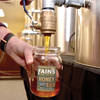

Depictions of humans collecting honey from wild bees date date back as far as 15,000 BC. Evidence of beekeeping, in which hives were kept for the purpose of the collection of honey, has been found up and down the Nile river in ancient Egypt, and substantiated by written records which date back as far as 3000BC. Honey stored in clay jars, can literally last forever—hence their inclusion in many a Pharaoh’s tomb. Apparently King Tut had a sweet tooth.
So did King Solomon. In 900BC the king recommended honey to his son in Proverbs 24:13.
Aristotle’s research on bees and beekeeping in 384BC, confirmed that bees do not visit flowers of different kinds on one flight, but remain constant to one floral species.
It is thought that honey bees were first brought to America by Irish and Norwegian explorers around 800-900 AD.
Stefano Della Rocca, a Catholic priest from the Greek island of Syros, has the honorable title, “father” of beekeeping for designing and building the first wooden hive with a movable comb in 1780. In 1851, an American named Lorenzo Langstroth developed the moveable frame. The Langstroth hive is still the standard to this day.
In the early 1920’s, as many an American farmer struggled to make ends meet, a young Texan in Gatesville county named H.E. Fain, discovered a bee swarm on his property and, being the resourceful sort, built a few of those Langstroth hives and started farming honey on the side. By 1926, with honey showing more profit than the other produce, he turned to beekeeping full-time. As the business expanded, hundreds of hives were sent south to a ranch in Dilley, TX, where the bees feasted on the Huajillo brush and other south Texas desert staples like Whitebush and Mesquite -- thus giving Fain’s honey that distinct “southwest” flavor upon which it built its reputation-- and which keeps Texans coming back for more.
It wasn’t easy. Crop dusters nearly wiped out the colony with deadly pesticides in the 1940’s. Many beekeepers suffered the consequences and had to regroup, starting new hives. Fain moved to Llano county and, sharing the benefits of beekeeping with various ranchers, soon set up hives on numerous ranches in the area. (Bee pollination is required for seed production of the clover and alfalfa on which cattle munch incessantly.)
With H.E’s four sons all helping work the bees, pack the honey, and deliver it to local outlets, the business continued to grow. Despite H.E.’s admitted lack of salesmanship-- he used to quip that often “the labels wore off before he sold it” -- Fain’s Honey became a familiar name throughout central Texas. However, supply was greater than demand and excess honey was sold to Sue Bee in the Temple, Texas area.
When, in the 1970’s, H.E.’s youngest son, Dewey, took over the business, he took the bee by the antennae. He was a salesman, and “boutique honey” had become a ‘thing.’ Maybe Fain’s flavors helped make it a thing….. for by adding certain flavors, expanding their circle of clientele, and establishing some solid new trade routes, Dewey put Fain’s Honey on the map. Soon reaching the “tipping point” – with demand now greater than supply, they had to outsource honey from other local bee keepers just to keep up.
Like his father before him, Dewey’s son, Keith, followed in his father’s footsteps, learning the business from the ground up. When Keith bought out his father in 2005, Fain’s Honey was a staple in local gift shops and over 60 HEB stores. Keith and his wife Debra took Fain’s Honey to the next level. Now stocked in over 300 HEB stores, Fain’s is a name recognized across the entire state, a favorite go-to gift for thousands of Texans.
But the downside of growing a business so successfully, is that it makes it harder for the next generation to take over. Such was the case here. And as they say, timing is everything.
Enter Clint Walker III
The George Clinton Walker family apiary traditions date back almost as far as those of the Fain family. As a teenager in Lee County, Texas, in the 1930’s, George Clinton Walker II found a summer job with a local beekeeper near Lexington. Two years later, having learned the trade, eighteen year old Walker II convinced his father, George Clinton Walker I, to go into the bee business with him. He did. Seeking greener pastures, the Walkers moved their bees to the Rio Grande valley in the early 1940's, where the orange groves blossomed and nectar was abundant. There they honed their skills for several years, successfully growing the company and their bee population...until their bees succumbed to the same unannounced crop dusting that nearly ruined the Fains.
Undeterred, the Walkers, with another George Clinton Walker (III) recently added to their own hive, packed up the few surviving bee hives and moved to Bell county, Texas. For several years they followed the flow and the seasons, taking their bees where the cotton bloomed on the high plains near Lubbock, then further south, for more cotton and the whitebrush and wildflowers that seduced the bees of south and central Texas in springtime. But again, due to pesticides, they were forced give up on the cotton blooms. Like the Fains and other central Texas apiaries, they, and their bees, became reliant entirely upon Indian Blanket, Horsemint, and other wildflowers and uncultivated Texas blooms.
Business bloomed as well. Walkers II and III served as Presidents of the American Beekeeping Association, and Walker II served on the National Honey Board, lobbying against the pesticide giants for the rights of bees (and beekeepers).
Meanwhile, Walker III went to college, earned a doctorate, dabbled in another field, returned to the hive, and added yet another George Clinton to the Walker colony. Like his father, Clinton IV learned the skills of beekeeping at an early age, minding both the hives and the storefront. And, like his father, he went off to school, and became an entrepreneur…until serendipity intervened. As previously mentioned, timing is everything.
As friends and fellow apiaries, the Fain and Walker families had known each other for generations. When the Fain’s decided it was time sell, they didn’t want to just sell out – they wanted someone to take over Fain’s Honey. But not just anyone. They wanted Walker -- because of his excellent reputation as a beekeeper, because they wanted the Fain name to remain on the shelves, and because they wanted quality to remain part of that recipe.
So one day, when Clint asked Keith for advice about coaxing his son back into the business, Keith smiled and said, “as a matter of fact, I’m looking to sell. Why don’t ya’ll buy me out?”
And like a bee to honey, Walker IV was seduced back to the hive,
At the Fain Honey retail/warehouse, located at 14817 E. State Highway 29, just a stone’s throw west the 1431 intersection, young entrepreneur, George Clinton Walker IV, who goes by Clinton, his crew Production Manager, Shane Pope (a former Fain employee), and Jordan Braschler, Retail Manager, have big plans for the future of Fain’s Honey. Under the Walker umbrella, they will continue the tradition of two families, producing the best honey in Texas, and filling those familiar hexagon jars (and larger ones) with the same delicious mix of southwest Texas flavors they always have. Flavors of youpon, harvested in February/March in Milam and Lee counties; galardia harvested in May from the Bell county area; and beebrush and wildflowers harvested in May and June, right here in Llano county.
As always, you’ll also find those southwest honey flavors mixed with cinnamon, pecans, blackberries, lemons, or peaches, to create that famed Fain favorite, the creamed honey spread. Sweet smelling beewax based soaps and candles round out the selection.
While continuing to stock at local boutique stores across Texas, Clinton and his crew also plan to expand their retail presence, creating a patio style tasting room for honey lovers and ….. those with an interest in mead. A version of “wine” made from fermented honey instead of grapes, mead, in various flavors, should be available in the spring, and will be retailed under a newly established label, Packsaddle Nectars, a honey fermentation company also under the Walker umbrella.
Suffice it to say, Fain’s Honey will remain a flavorful presence in the Texas hill country, continuing to enrich the palates of Texans in more ways than one.
Online orders can be placed at: fainshoney.com




